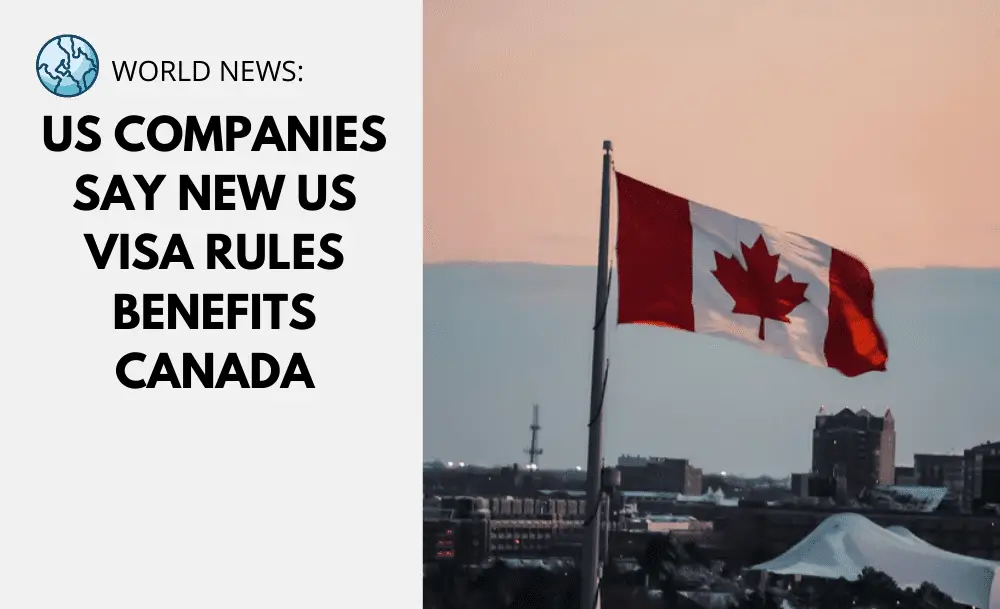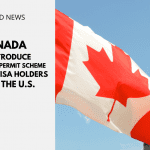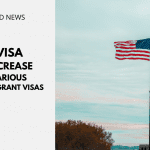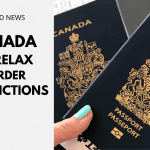US companies say new US visa rules benefits Canada


The Trump immigration clampdown risks many highly skilled workers from the US to move north of the border to Canada.
Company executives and immigration advisers on both sides of the border expect that the new US immigration rules will be bad for the US. Instead of protecting US jobs, Donald Trump’s restrictions on visas for foreign workers are expected to encourage companies to move highly skilled migrants and jobs to Canada.
From Toronto to Vancouver, Canada has already stopped and reversed the “brain drain” of professionals to US business hubs in recent years. Now with the more aggressive US rhetoric & immigration policies, the relative affordability of housing and healthcare is swaying Canadians to stay and more immigrants to choose Canada over the US.
President Trump’s decision to extend a ban on permanent US residency applications and stop issuing other work permits such as H-1B visas has really helped Canada’s ability to compete for limited talent. This is according to technology and consulting executives, who are among the biggest users of such visas.


The FT reports that Tobi Lutke, chief executive of Shopify, based in Ottawa, urged companies affected by the halt in H-1B visa issuance to “consider coming to Canada instead”, steering potential applicants with his tweet to a careers site.
“Just look to the north, where we welcome you (and your family) with open arms . . . Did I mention free healthcare?”
Patrick Pichette, chairman of Twitter, tweeted to H-1B seekers
Rich Lesser, chief executive of Boston Consulting Group, stated that his firm had already offered jobs to several candidates that are going to be affected by the new H-1B and L1 visa rules. Instead of retracting those offers, “by necessity we will move them to other countries, probably Canada”.
The US risks suffering “a migration of top talent” which would otherwise have been paying American taxes, Rich Lesser warned, dismissing the administration’s argument that the measures would speed the recovery of the US economy.
A CBRE study last year found that Toronto was North America’s fastest-growing market for tech jobs and its third largest after the San Francisco Bay Area and Seattle.
“What we want to tell international businesses around the world is, just because America has decided to close its doors to international talent, doesn’t mean North America has decided to close its doors. Canada has not,” said Mark Cohon, chair of Toronto Global, a group that markets the city’s “open doors” immigration policy to potential foreign investors.
Talented workers, executives and tech personnel are being wooed by Canada as their next destination.
Marco Mendicino, Canada’s immigration minister, told an interviewer he saw “a tremendous opportunity”, and Canadian immigration advisers said the new US restrictions had sparked a flood of inquiries from tech professionals from India, China and other countries.
“Come to Canada.” is what immigration minister Marco Mendicino said when asked about the immigration suspension in the USA.
Although Trump has halted US immigration, Canada is still committed to welcoming immigrants from around the world.


The Trump administration hopes that suspending immigration to the US will help Americans that are financially struggling, because of COVID-19, to find employment post-pandemic.
However, it is thought that the American authorities may be taking advantage of the coronavirus pandemic to limit immigration. This seems to fall in line with the president’s history of anti-immigration rhetoric.
The US has clamped down on visas at a time when the Covid-19 pandemic has restricted international travel and many companies have become used to having most of their workforce operating remotely.
Canada was still letting people enter the country to report for work. Canada would remain attractive for US companies because of its similar time zones and its trusted intellectual property regime.
Coronavirus had also persuaded some clients that distributing their people around offices in different countries might lower the risk of further outbreaks causing serious disruptions.
Employers’ broadly positive experience of having staff working from home was unlikely to stem US companies’ demand for work visas, BCG’s Mr Lesser said. He predicted, however, that they would create “hubs of capability outside the US” if they did not see their home country as “a safe and predictable place to put top talent”.
The US has since outlined ways for which non-immigrant visa holders can still apply and enter the US by requesting a waiver or National Interest Exemption (NIE). This may help with accessing the US labour market. But the types of visas that highly skilled workers are going on are not subject to those exemptions.
Canada’s committed to immigration.
The Canadian immigration minister reaffirms Canada’s commitment to immigration. Canada continues to welcome immigrants through Express Entry draws, the Provincial Nominee Program (PNP) and the Canadian Experience Class (CEC).
In addition, temporary foreign workers are exempt from the travel restrictions put in place to curb the spread of COVID-19.
Canada had wanted to welcome over 340,000 immigrants in 2020, according to the 2020-2022 immigration levels.
Temporary foreign workers have various options for pathways to permanent residence. International students also have options for pathways to permanent residence upon completion of your study program.
If you have questions or need assistance, comment below or reach out to your visa coordinator at IaM
- How to apply for an adult dependant relative visa to come to the UK - 22 March 2023
- India Has Strike Deals To Get Working Holiday Visas For Young Indian - 27 January 2023
- The Best European Cities To Move To In 2023 - 1 January 2023









